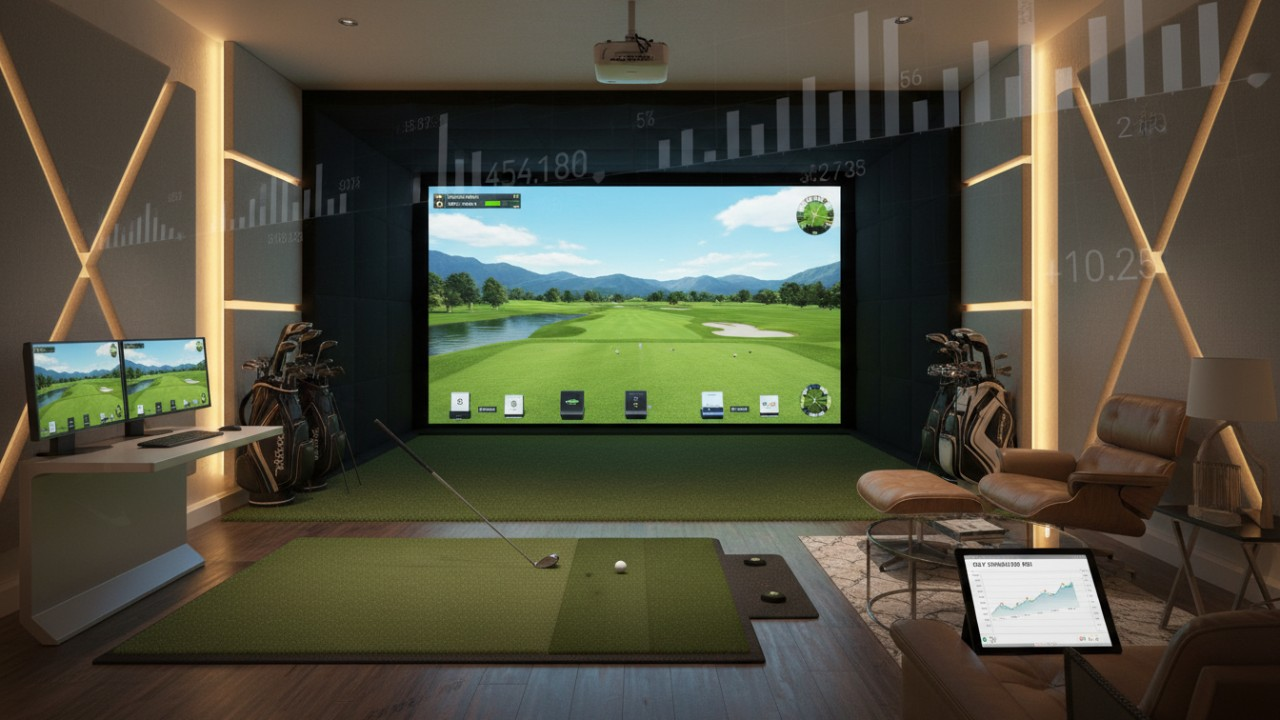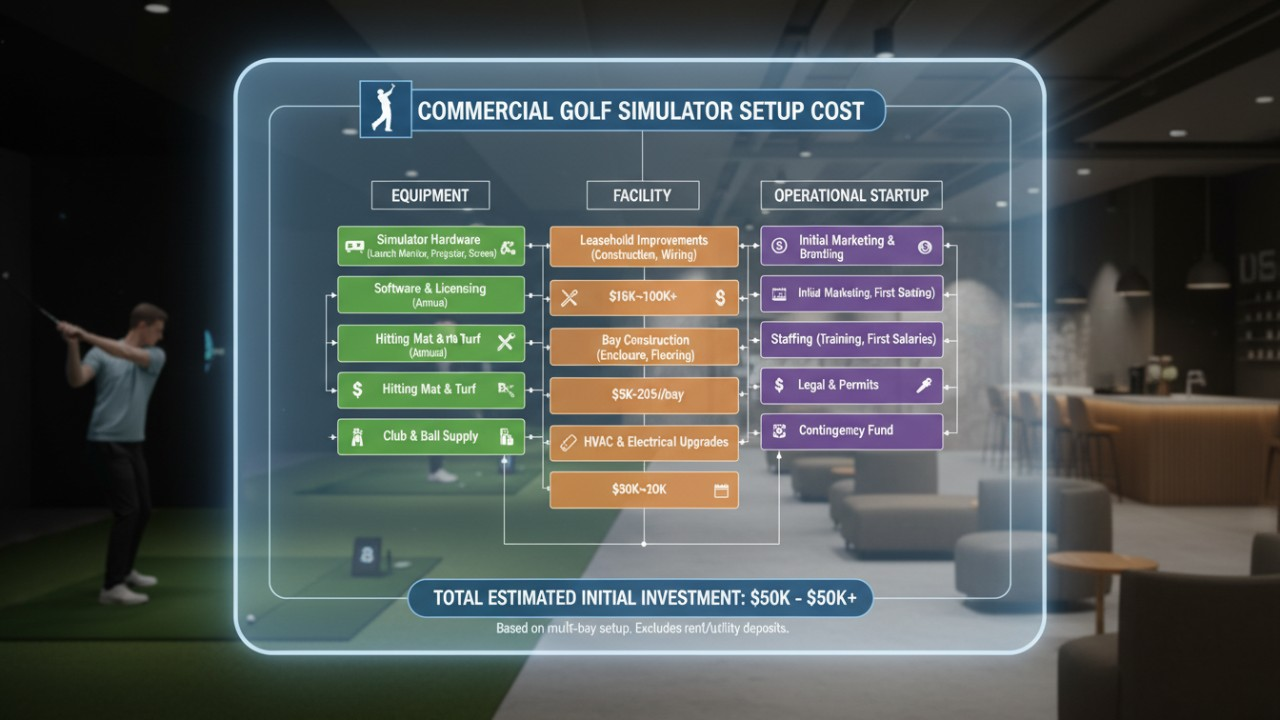How to Start a Golf Simulator Business in 2025: The Ultimate Cost & Profit Guide
- Introduction: The Rise of Indoor Golf Entertainment
- Location & Technical Specifications: Finding the Perfect Space
- Crucial Dimensions: Height is Non-Negotiable
- Floor Plan Layouts
- Equipment & Software Ecosystem
- Hardware Breakdown
- Software Comparison
- Financial Breakdown: Costs and ROI Analysis
- Startup Capital (CapEx)
- Operating Expenses (OpEx)
- Revenue Projections
- Business Model & Operations
- Pricing Strategies
- Legal Requirements
- Marketing Your Golf Lounge
- Conclusion
- FAQs
- Contact Us

The landscape of golf is undergoing a radical digital transformation. Gone are the days when the sport was strictly limited to country clubs and fairways. In 2025, indoor golf entertainment is not just a niche alternative; it is a booming industry sector driving the sport’s growth. According to the National Golf Foundation, off-course participation (including simulators and driving ranges) has surged, with over 19 million Americans participating exclusively in these venues in recent years.
For entrepreneurs, this represents a golden opportunity. With the market projected to grow at a CAGR of roughly 9.7% through the decade, opening a commercial golf lounge offers a lucrative blend of technology, hospitality, and recurring revenue. However, success requires more than just buying launch monitors; it demands a robust indoor golf business plan template that covers everything from acoustics to liquor licensing.

This guide details exactly how to navigate commercial golf simulator setup costs, technical specifications, and operational workflows to build a profitable venue.
Introduction: The Rise of Indoor Golf Entertainment
The shift toward "screen golf" is driven by convenience and gamification. Modern players demand year-round access, weather independence, and a social environment that traditional courses often lack. This evolution has created a demand for high-end "eatertainment" venues where technology meets hospitality.
At the forefront of this shift are turn-key solutions. Companies like JAMMA Amusement have spent over 15 years refining the manufacturing of arcade and entertainment machinery, providing the reliable hardware backbone necessary for high-traffic commercial venues. Leveraging such expertise is often the difference between a glitchy DIY setup and a seamless professional operation.
Location & Technical Specifications: Finding the Perfect Space
Selecting the right real estate is the single most critical decision you will make. A standard retail space often fails to meet the unique commercial golf simulator room dimensions required for safety and playability.
Crucial Dimensions: Height is Non-Negotiable
The absolute "kill factor" for potential locations is ceiling height.
· Ceiling Height: You must have a minimum clear height of 10 feet. However, for a commercial setting where customers of varying heights swing drivers, 11 to 12 feet is strongly recommended to prevent equipment damage and player anxiety. (See ergonomic workspace standards regarding human reach and clearance).
· Width: A minimum of 15 feet per bay allows for a comfortable hitting area and safe movement for both left- and right-handed players.
· Depth: Plan for 20-25 feet of depth. This accommodates the impact screen, the tee to screen distance (typically 10-12 feet), and a safe "buffer zone" behind the player for seating and food service.
Floor Plan Layouts
Your layout directly impacts your golf lounge revenue model. A "shallowed-out" bay design maximizes the number of simulators but may cramp the social experience.
· The Lounge Hybrid: Dedicate 40% of your floor plan to the bar and seating areas. High-margin F&B (Food & Beverage) sales rely on customers lingering after their rental time ends.
· Acoustics & Lighting: Impact noise from a driver hitting a ball can reach 100+ decibels. You must invest in sound-dampening baffles and carpeted walls. Furthermore, lighting must be zoned—ambient light for the lounge, but controlled darkness over the hitting bay to ensure projector contrast.
Equipment & Software Ecosystem
Your technology stack determines your customer retention. In a commercial environment, durability and accuracy are paramount.
Hardware Breakdown
· Launch Monitors: Camera-based systems (like Foresight or Uneekor) are generally preferred over radar for indoor commercial use because they require less flight distance to read spin rates accurately.
· Impact Screens: Commercial-grade screens must withstand thousands of shots per week. Double-layer, tightly woven fabrics reduce noise and "bounce-back" (a dangerous phenomenon where the ball ricochets back at the player).
· Projectors: You need 4K or high-lumen laser projectors (minimum 5,000 lumens) to combat ambient light in a lounge setting.
Software Comparison
The software is what the customer actually interacts with.
· GSPro: Currently the community favorite due to realistic physics and 4K graphics. It is open and supports community-created courses.
· E6 Connect: The industry standard for commercial reliability. It is stable, has excellent licensed courses, and offers robust commercial licensing options.
· TGC 2019: Offers the largest library of courses (100,000+) but can be more difficult to navigate in a commercial "kiosk" mode.
Pro Tip: Invest in auto-tee systems. These machines automatically dispense and tee up the ball after every shot. In a commercial setting, this increases shot volume by 30%, allowing customers to play more holes per hour, which increases perceived value and throughput.
Financial Breakdown: Costs and ROI Analysis
Understanding the commercial golf simulator setup cost is vital for securing funding. Below is a realistic estimation for a high-end, 4-bay commercial lounge.
Startup Capital (CapEx)
· Simulator Build-Out: $15,000 - $40,000 per bay (includes PC, monitor, enclosure, mat, and auto-tee).
· Renovation & Acoustics: $50,000 - $100,000 (flooring, soundproofing, electrical, HVAC).
· Furniture & Bar Equipment: $30,000 - $60,000.
· Total Estimated Startup: $150,000 - $350,000+ depending on finish level.
Operating Expenses (OpEx)
· Rent: Typically 10-15% of projected gross revenue.
· Software Licensing: Commercial licenses cost significantly more than home versions (often $1,000+ per year per bay).
· Staffing: You need tech-savvy servers.
· Maintenance: Projector bulbs and impact screens are consumables that need regular replacement.
Revenue Projections
· Bay Rentals: $40-$80 per hour (peak vs. off-peak).
· F&B: often accounts for 30-40% of total revenue.
· Leagues: Winter leagues provide guaranteed recurring revenue on weeknights.
· ROI Timeline: A well-run venue typically sees a golf simulator profit margin of 20-30%, with a Break-Even Point (BEP) reached in 18-24 months. For detailed business planning resources, refer to the Small Business Administration (SBA).
Business Model & Operations
Your golf lounge revenue model should rely on a hybrid of hourly rentals and membership tiers.
Pricing Strategies
· Peak/Off-Peak: Charge premium rates ($60-$80/hr) on evenings and weekends. Offer "Early Bird" specials ($30/hr) to fill bays during weekday mornings.
· Memberships: Offer monthly subscriptions that include unlimited off-peak play. This anchors your cash flow.
Legal Requirements
· Liquor Licensing: This is often the biggest hurdle. Regulations vary wildly by state. You must consult the Alcohol and Tobacco Tax and Trade Bureau (TTB) or your local state ABC board immediately, as permits can take 6+ months to acquire.
· Insurance: You need specialized commercial general liability insurance that specifically covers "active entertainment" risks.
· Permits: Zoning must allow for "indoor recreation."
Marketing Your Golf Lounge
To fill your bays, you must dominate the local search intent.
1. Local SEO: Optimize your Google Business Profile for keywords like "indoor golf near me" and "winter golf leagues."
2. Tournaments & Leagues: Create handicap-based leagues using your software's cloud capabilities. This builds a community that returns weekly.
3. Partnerships: Collaborate with local PGA professionals who need a winter teaching facility. They bring their students (your potential customers) to you.
Conclusion
Starting a golf simulator business requires more than just high-end equipment; it demands a solid understanding of space planning, financial modeling, and operational workflows. By addressing technical requirements like ceiling heights and navigating complex licensing early on, you position your venue for long-term profitability. With the market projected to hit billions in value, now is the time to leverage expert guidance and detailed planning to build a thriving indoor golf destination.
FAQs
How much does it cost to start a commercial golf simulator business?
Startup costs typically range from $150,000 to $500,000 depending on the number of bays, renovation needs, and whether you include a full bar/kitchen. High-end commercial simulators alone can cost $15,000 to $40,000 per bay.
What is the minimum ceiling height for a golf simulator business?
For a commercial setting, a minimum clear ceiling height of 10 feet is recommended to accommodate all swing types safely. Ideally, 11-12 feet is preferred to prevent damage and reduce player anxiety.
Are golf simulator businesses profitable?
Yes, they can be highly profitable with the right utilization rates. Successful venues often see profit margins between 20-30%, driven by a mix of bay rentals, food and beverage sales, and league memberships.
Do I need a liquor license for an indoor golf business?
While not strictly mandatory for the golf aspect, obtaining a liquor license is highly recommended as Food & Beverage sales often account for 30-40% of total revenue and significantly increase customer dwell time.
Contact Us
Ready to build your profitable indoor golf venue? Contact JAMMA Amusement today for expert consultation on turn-key simulator solutions and commercial arcade setups tailored to your business goals.
Best cycling vr simulator manufacturers and supplier brands
Top 5 interactive projection Company List and Products Compared
Tech Integration: AR/VR in Indoor Play Centers
Sports Simulation VR Experiences for Entertainment Venues
Product details
Can I customize the number of seats of 5D cinema?
Yes, we generally have options for six, nine, eighteen, twenty-four, and thirty-six seats, and the quantity of seats also can be customized.
What is the difference between 5D and 3D?
The visual of 5D cinema is the same as that of 3D, compared to 3D, it adds motion simulation and special effects, which are not available in 3D.
Does the soccer simulator configuration include the curtain?
Yes, a 4-meter-wide, 3-meter-high projection curtain is included.
Standard and other
Do you offer a customized service?
We can provide logo customization service for all of our products. For certain products, we can also support customization of sizes and game content. If you have any product customization requirements, please contact us and we will confirm the details with you.
How will it be transported?
For large items, we usually use sea freight, while for small items, we use air freight or services like DHL, FedEx, or UPS. We can also accommodate specific shipping methods based on your requirements.

Hottest activated LED dance grid tiles floor touch games
Super Grid is an immersive sports game that combines sports and technology. It integrates interactive LED lights and sensors through innovative software design, creating a fun gaming experience.

Top Indoor Tennis Racketball Training Simulator Dual Player Games
Interactive somatosensory fitness game
Combine traditional tennis sports with advanced 3D digital technology to bring customers an immersive tennis training experience
COMBINE TRADITIONAL TENNIS SPORTS WITH ADVANCED 3D DIGITAL TECHNOLOGY TO BRING CUSTOMERS AN IMMERSIVE TENNIS TRAINING EXPERIENCE INDOOR AND TENNIS EXPERIENCE HALL

Super Grid Interactive LED Floor Activate Game Team Play
Super Grid is an immersive sports game that combines sports and technology. It integrates interactive LED lights and sensors through innovative software design, creating a fun gaming experience.

Immersive 5D/7D/9D cinema dynamic visual experience room
Compared with other types of theaters, 5D/7D/9D cinema have high technical content, prominent themes, and have a strong impact on the characteristics of the picture. With the increasing demand in the entertainment market and the continuous development of video entertainment technology, in the past, audiences would experience vibration, drop, rain, scratches and other effects in some 4D theaters, but now with 5D theaters, audiences can experience new Unique features, touch and feel effects such asreal smoke, water, snow, bubbles, smell, lightning, leg touch,camera system and more. When the audience is watching amovie, the seats and environmental effects will change into corresponding actions according to the development of the movie,allowing the audience to experience an immersive viewing experience.

